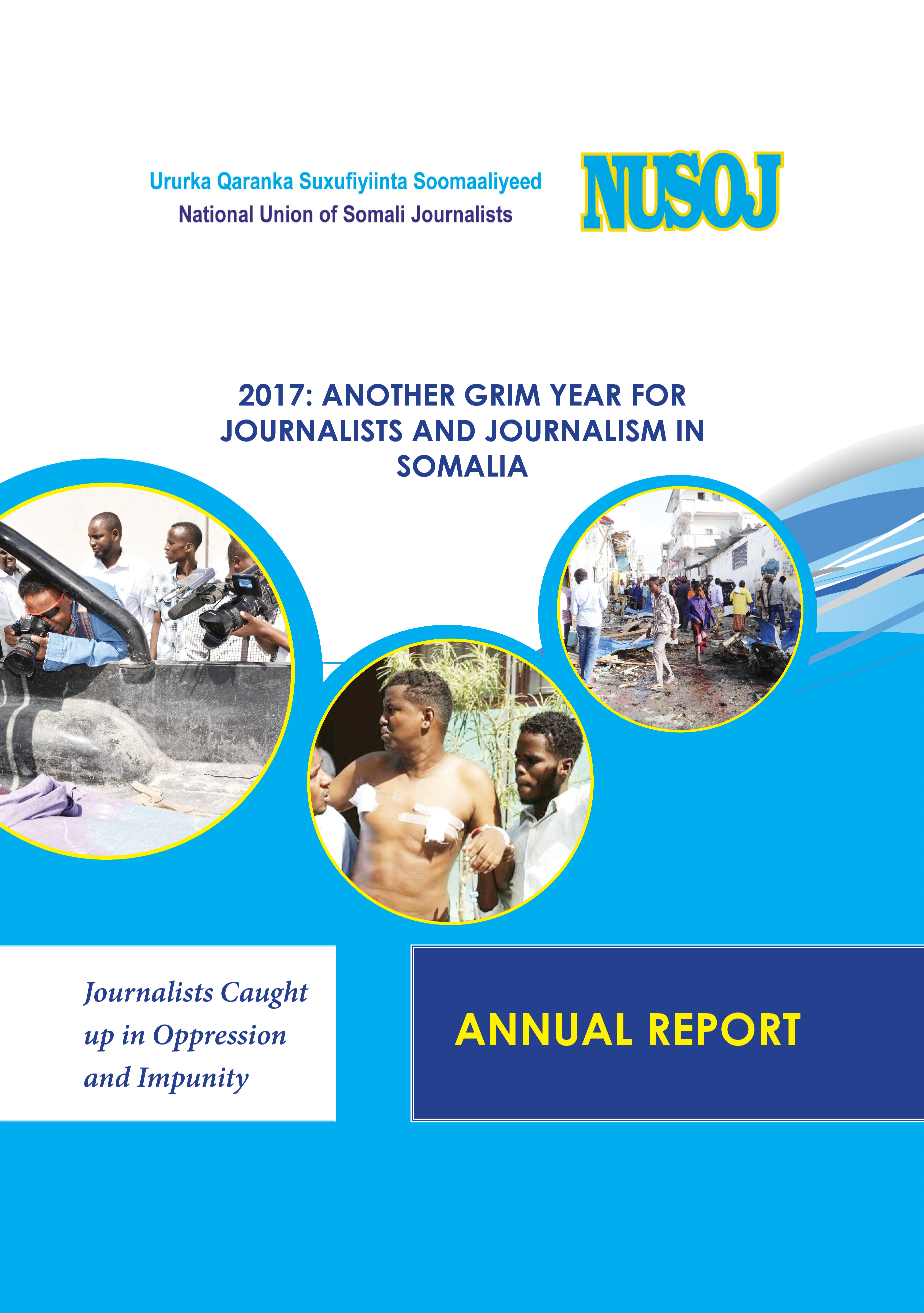The year 2017 saw very little easing of the continued attacks on journalists in many regions of the country. Violence, attacks, impunity and injustice against journalists and media in Somalia remained widespread, systematic and involved a variety of perpetrators. Journalists and other media workers were killed, ill-treated, arrested, injured, threatened with death and intimidated.
Continued media freedom violations and abuses of rights of journalists were reported in almost all the main regions of the country. Journalists were deliberately targeted as they tried to report on the plight of the people, to independently inform the public on current issues and expose serious human rights violations. Journalists and media houses that are vocal and critical of the political sides in an independent and professional manner are constantly targeted.
The National Union of Somali Journalists (NUSOJ) monitored, recorded and reported on numerous cases of attacks against media professionals and news media organisations, particularly in Berbera, Hargeisa, Garowe, Kismayu, Mogadishu, Galkayo, Bossasso, Baidoa, Beledweyne and Jowhar.
Although, the number of murders has fallen, oppressive practices against journalists diversified. Killings and other threats to journalists and media freedom have been very
serious. Four journalists were killed, 12 wounded, while 22 journalists were arrested and
8 beaten up, or threatened with death or imprisonment.
The last four months of the year were particularly bloody, considering that no journalist
was killed during the first eight months. Three of the four killed journalists died in bomb
blasts planned to take away innocent lives, and the country’s capital Mogadishu once
again emerged as a deadly city for journalists.
Journalists continued to face arrests and illegal detentions whereas some were beaten up
and others openly threatened with extrajudicial punishments in most major cities such
as Kismayo, Beledweyne, Garowe, Hargeisa, Baidoa and Las Anod. Somaliland authorities
have emerged as the sole authority that actively punish journalists by using the penal
code to criminalise what they speculate to be “false news” and “defamation.” In Hargeisa,
the National Union of Somali Journalists (NUSOJ) investigated numerous cases of judicial
harassment of journalists.
While the situation was very terrible for journalists in Mogadishu and other southern
regions, the situation was no better in Puntland, the northeast region of Somalia, as several
journalists were attacked and authorities made intimidation and harassment an everyday
reality for media professionals working in Puntland.
Somaliland is one of the most egregious violators of press freedom as journalists have also
come under attack in its bid to restrict critical reporting and unfavourable reports. Judicial
Harassment against independent journalists is continuing in Hargeisa, Barbara and Borame.
Two news media organisations were shut-down in 2017 while six news websites were
blocked, thus restraining online freedom of expression.
2017 has also been election year, which led to a change in the leadership of the federal
government. In the run-up to these elections, candidates used massive bribes to buy media
support, which led to the flagrant abandonment of basic tenets of ethical journalism, the
erosion of professionalism and biased reporting.
Journalists in Mogadishu have faced shrewd censorship and harassment from both the
security forces and the ministers in the Federal Government. The consequences of media
censorship and harassment of journalists and media houses has been to create fear from
reprisal among the media community, which has resulted in a prevalence of self-censorship.
Despite optimism that the federal government of President Mohamed Abdullahi Farmaajo
would lead to an improvement in respect for the right to freedom of expression, the
situation continued to worsen in almost all categories of press freedom. Journalists who
voice concern or criticize the government are intimidated into silence, arrested or forced
into self-censorship. This makes journalists completely incapable of seeking out and
exposing the truth.
The media law that was passed by President Hassan Sheikh Mohamud government was not
fundamentally reviewed before it was implemented. The current government presented
a draft media bill to the parliament which again introduced manifold restrictions aiming
at restricting journalists and paralysing the privately-owned media. It also set strict
conditions for registration and facilitates broad interference by the Ministry of Information
in media matters. The law imposed draconian restrictions on the right to media freedom
and freedom of expression, and put the composition, operations and independence of
the National Media Council firmly under government control.
Impunity remains widespread as senior government officials brazenly threaten or instigate
attacks against journalists, knowing full well that they will not be held accountable. The
culture of impunity in relation to attacks on journalists, such as murder, intimidation and
threats is pervasive. NUSOJ, however, welcomed the arrest by Somali security forces of
four persons suspected of the latest killing of journalist Mohamed Ibrahim Mohamed
Gabow, and called for justice to be delivered through due process.
By
Omar Faruk Osman
Secretary General
National Union of Somali Journalists (NUSOJ)

